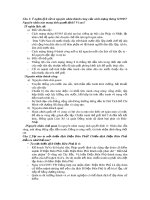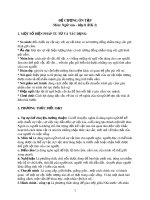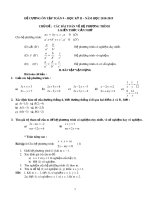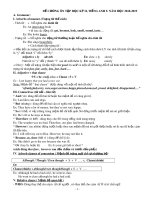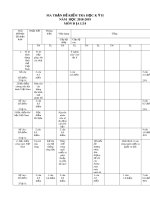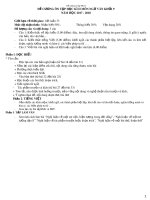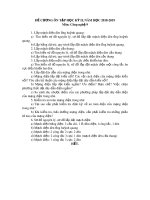Đề cương ôn tập học kì 2 môn Tiếng Anh 9 năm 2018-2019 - Trường THCS&THPT Võ Nguyên Giáp
Bạn đang xem bản rút gọn của tài liệu. Xem và tải ngay bản đầy đủ của tài liệu tại đây (458 KB, 13 trang )
ĐỀ CƯƠNG ÔN TẬP HỌC KỲ II, TIẾNG ANH 9 NĂM HỌC 20182019
A. Grammar:
I. Adverbs of manner.(Trạng từ thể cách)
Tính từ : + bổ nghĩa cho danh từ
Ex: An interesting book
+ đi sau các động từ: get, become, look, smell, sound, taste,....
Ex: She looks happy.
Trạng từ : + bổ nghĩa cho động từ thường hoặc bổ nghĩa cho tính từ
Ex: She sings beautifully.
+ Cách thành lập trạng từ :
+ Hầu hết các trạng từ chỉ thể cách được thành lập bằng cách thêm đuôi LY vào tính từ:(tính từ tận cùng
là “y” đổi thành “i” rồi thêm “ly”
Adjective + ly adverb
Ex: slow + ly slowly
Tính từ có “y” đổi y thành “i” sau đó mới thêm ly Ex: noisy noisily
+ Chú ý : Một số trạng từ đặc biệt như good => well và một số từ không đổi ở cả hình thức tính từ và
trạng từ như fast, fair, early, late, fast, hard......
II. Adjective + that clause
S + be +Adj +that + Clause : S + V
Ex : I am happy that you had a new car.
Note: Mệnh đề “ that clause” được dùng với một số tính từ như :
“afraid,glad,sorry, sure,eager,anxious,happy,pleased,annoyed, proud, delighted, disappointed,…”
III. Connectives (từ nối – liên từ)
* And (và): dùng để nối hai từ hoặc hai mệnh đề có cùng giá trị .
Ex: Lan likes cats and dogs.
* But (nhưng) : dùng để nối hai câu có nghĩa trái ngược nhau.
Ex: They have a lot of money, but they’re not very happy.
* So (vì thế, vì vậy):dùng trong mệnh đề chỉ kết quả. Nó đứng trước mệnh đề mà nó giới thiệu
Ex: He’s ill so he stays at home.
* Therefore (vì thế) : dùng thay cho SO trong tiếng Anh trang trọng
Ex: The weather was too bad. Therefore, our plan had been changed.
* However ( tuy nhiên) đứng trước hoặc theo sau mệnh đề mà nó giới thiệu hoặc nó đi sau từ hoặc cụm
từ đầu tiên.
Ex: I will offer my cat to Hoa. However, he may not like it.
* Because, as, since (bởi vì ) dùng để chỉ lý do
Ex: She didn’t go to the zoo because she was ill.
* Or ( hay là, hoặc là)
Ex: Is your girl tall or short ?
(cách dùng therefore , however sau dấu chấm và trước dấu phẩy)
IV. Adverb clauses of concession ( Mệnh đề trạng ngữ chỉ sự nhượng bộ)
Although / Though / Even though + S + V …. +, Clause(chính)
Or
Clause(chính) + although/even though/though + S + V ….
Ex: Although he had a bad cold , he went to class.
He went to class although he had a bad cold.
V. Relative clause ( Mệnh đề quan hệ )
WHO: Dùng thay thế cho cụm từ chỉ người , nó thay thế cho cụm từ ở vị trí chủ ngữ.
1
I need to meet the boy. The boy is my friend’s son.
I need to meet the boy who
is my friend’s son.
WHOM: Dùng thay thế cho cụm từ chỉ người , ở vị trí bổ ngữ ( Complement)
Ex: The man is my teacher. Your father is talking to him.
The man whom
your father is talking to
is my teacher.
WHOSE: Là đại từ quan hệ chỉ sự sở hữu . Nó thay thế cho sở hữu của người, vật (his, her, its,
their).
This is the student. I borrowed his book.
This is the student whose
book I borrowed
.
WHICH: Dùng thay thế cho cụm từ chỉ đồ vật ,ở vị trí chủ ngữ và bổ ngữ.
She works for a company. It makes cars.
She works for a company which
makes cars
.
THAT : Dùng thay thế cho WHO/WHICH
Defining and Nondefining Relative Clauses: MĐQH giới hạn và MĐQH không giới hạn
1. Defining Relative Clauses: MĐQH giới hạn
Dùng để bổ nghĩa cho danh từ đứng trước chưa được xác định rõ. Nếu bỏ đi mệnh đề chính sẽ không
rõ nghĩa.
Ex: I saw the girl. She helped us last week.
I saw the girl who/that helped us last week.
2. Nondefining Relative Clauses: MĐQH không giới hạn
Dùng để bổ nghĩa cho danh từ đứng trước đã được xác định rõ, là phần giải thích thêm. Nếu bỏ đi
mệnh đề chính vẫn rõ nghĩa. Mệnh đề này thường được tách khỏi mệnh đề chính bằng dấu phẩy “,”.
Ta dùng mệnh đề quan hệ không giới hạn khi:
Trước danh từ quan hệ có: this/that/these/those/my/her/his/…
Ex: My father is a doctor. He is fifty years old
My father, who is fifty years old, is a doctor.
Từ quan hệ là tên riêng hoặc danh từ riêng.
Ex: Mr Brown is a very nice teacher. We studied English with him.
Mr Brown, who we studied English with, is a very nice teacher.
* LƯU Ý: KHÔNG dùng that thay cho who, which, whom trong MĐQH không hạn định.
VI. Conditional sentence : Câu điều kiện loại 1(có thể xảy ra ở hiện tại & tương lai):
If Clause(mệnh đề If )
Main Clause( m.đề chính )
HTĐ
am /is / are
will / can / may +V1
V1/Vses
(don’t/doesn’tV1)
(Chủ ngữ : He,She,It + Vs,es)
Ex : I will stay at home if it rains
If you leave
before 10 o’clock, you will catch the train easily
VII. Phrasal verbs : Cụm động từ .
turn off : Tắt . Ex : Remember to turn off the light before going to bed .(Nhớ tắt đèn trước khi đi ngủ )
turn on : Bật . Ex : Would you mind turning on the TV ? ( Chị làm ơn bật tivi lên giúp em được không ạ
?
go on : Tiếp tục Ex : She went on singing in the rain . ( Nàng vẫn tiếp tục hát dưới mưa )
look for : tìm kiếm Ex : What are you looking for ? ( Anh đang tìm gì vậy ?)
2
look after : Chăm sóc , trông nom Ex : Who’s going to look after the children while you’re away ? (Ai sẽ
chăm sóc những đứa trẻ khi chị đi vắng ? )
VIII. Making suggestions : Đưa ra lời đề nghị .
a) suggest + Ving …
d) Why don’t we + V…?
Ex : Why don’t we go to the movies ?
suggest(that) S + should + V …
Ex : I suggest going to the movies . (Tôi đề nghị đi e) How about + Ving …?
xem phim )
Ex : How about going to the movies ?
I suggest (that) we should go to the movies .
f) What about + Ving …?
b) I think we should + V…
Ex : What about going to the movies ?
Ex : I think we should go to the movies .
g) Let’s + V…
c) Shall we + V …?
Ex : Let’s go to the movies.
Ex : Shall we go to the movies ?
IX. Compliments:
Give a compliment (cho lời khen )
Respond to a compliment (đáp lại lời khen)
Well done.
Thanks.
That is a great / an excellent ……..
It is nice of you to say so.
Let me congratulate you on………….
That is very kind of you.
X. Adverb clause of reason :
Because / As / Since + S + V , S + V
Or
S + V because / as / since S + V .
Ex. Nga gets good marks because / as / since she studies hard.
Because / As / Since Nga studies hard , she gets good marks.
B. Exercises:
I. Choose the word that has the underlined part pronounced differently from the others
1. A. reduce
B. recycle
C. receive
D. separate
2. A. considerate B. celebrate C. nominate D. congratulate
3. A. environment
B. bike
C. pesticide
D. provide
4. A. Easter
B. creature
C. repeat
D. bureau
5. A. plastic
B. provide
C. picnic
D. similar
6. A. border
B. important
C. information
D. thunderstorm
7. A. bill
B. bulb
C. plumber
D. label
8. A. amount
B. sound
C. south D. countryside
9. A. jeans
B. peace
C. wear
D. mean
10. A. pesticide B. provide C. solid D. dynamite
11. A. volcano
B. damage
C. earthquake
D. teenager
12. A. environment
B. recycle
C. dynamite
D. littering
13. A. consumer
B. reduce
C. use
D. plumber.
14. A. teach
B. weather
C. season
D. reading
15. A. asked B. placed C. played D. watched
16. A. scholarship B. champagne C. school
D. Christmas
II. Choose the best option A,B,C or D to complete the following sentences.
1. Neil Armstrong,_______ walked on the moon, lived in the USA.
A. who
B. that
C. which
3. Mary’s eyes are weak; _______, she has to wear glasses
3
D. whom
A. but
B. therefore
C. however
D. so
4. My father never misses the weather_______ on TV
A. talk
B. prediction
C. spread
D. forecast
5. I turned _______ the TV to see the weather forecast.
A. on
B. down
C.off
D. up
6. You should get a_______to check the water pipes
A. worker
B. farmer
C. teacher
D. plumber
7. In north and south America, the stropical storm is called _______.
A. cyclone
B. hurricane
C. big wind
D. typhoon
8. If you _______ down the trees in the forest, there will be big floods
A. cut
B. are cutting
C. will cut
D.can cut
9. Judy really likes the fullmoon festival _______happens in mid Fall
A. which
B. who
C.whose
D.whom
10. _______are funnelshaped storms which pass overland below thunderstorms
A. Earthquakes
B. Tidal waves
C.Tonadoes
D. Typhoons
11. Family members_______live apart try to be together at Tet.
A. who
B. whom
C.which
D.whose
12. If it rains this evening, I _______.
A. go out
B. will go out
C. won’t go out
D. goes out
13. The country _______won the 1998 Tiger Cup is Singapore.
A. who
B. whose
C. which
D. where
14. Mai is talking _______ because she has done her test perfectly.
A. happy
B. happily
C. unhappy
D. unhappily
15. _______ she was tired, she helped him with his homework.
A.Although
B.If
C.When
D.So
16. She forgot to turn _______ the faucet when she left for work.
A. on
B. down
C. up
D. off
17 .I suggest_______ some money for poor children.
A. to raise
B. raising
C. raised
D. raise
18. It’s very nice _______ you to say so!
A. in
B. on
C. of
D. for
19. Kobe in Japan was completely _______ in 1995 by a huge earthquake.
A. to destroy
B. Destroy C. destroyed D. destroying
20. Auld Lang Syne is a song _______ is sung on New Year’s Eve.
A. which
B. who
C. whom
D. when
21. There is too much traffic. ______, the air is polluted.
A. Since
B. Therefore
C. However
D. But
22. I’m __________that I can go to Dalat this time.
A. excited
B. exciting
C. excitement
D. excite.
23. Solar energy doesn't cause _________ .
A. pollution
B. polluted
C. pollute
D. pollutant
24. If people _________energy, there will be no shortage of electricity.
A. save
B. will save
C. saving
D. would save
25. We are saving money ________ we want to buy a new house.
A. so
B. and
C. because
D. but
26. He loves his parents very much and wants them to be ________.
A. happy
B. happily
C. happiness.
D. happiest
27. It was hot, _______ I turned on the air conditioner.
4
A. because
B. so
C. although
D. but
28.I like reading books _______ tell about peoples and their cultures.
A. which
B. whom
C. whose
D. who
29. We should take a shower instead of a bath to save_______
A. electricity
B. water
C. solar energy
D. gas
30. Ba ate a lot of food _______ he wasn’t hungry.
A. so
B. because
C. therefore
D. though
31. It was raining hard , ………... we could not go on a picnic as planned .
A. however B. but C. because D. so
32. Tommy suggested …….. a pairs of shoes for Dad on his birthday .
A. buying B. buy C. to buy D. bought
33. The children laughed ……... when they were watching a comic
A. happiness B happy C happily D unhappy
34. If it continues to rain , I think we …… home and watch TV .
A.would stay B. will stay C. used to stay D. stay
35. There is too much traffic ….... , the air is polluted .
A. however B. since C.therefore D. but
36. A disastrous volcanic eruption happened in the Philippines ....... 1991.
A. on B.in C. at D.since
37. UFOs are believed to be spacecrafts from another_____________.
A. evidence
B. existence
C. planet
D. creature
38. A dripping faucet can ___________ a lot of water.
A. waste
B. save
C. use
D. reduce
39. We can reduce garbage by __________ plastic bags.
A. polluting
B. reusing
C. throwing
D. littering
41. Binh Thuan can use__________________ as a source of energy.
A. coal
B. gas
C. wind
D. oil
III.Join the sentences. Use the words in brackets.
1. My Aunt Judy is the woman. She is holding Jack. (who)
……………………………………………………………………………………………………………………………………………………………….
2. I'm hungry. I haven't eaten all day.(because)
……………………………………………………………………………………………………………………………………………………………….
3.The house is cheap. We decided to buy it.(so)
…………………………………………………………………………………………
4. Ha is not satisfied with her preparations for Tet. She has made plenty of cakes. (even though)
……………………………………………………………………………………………………………………………………………………………….
5. I broke the cup. I was careless.(since)
……………………………………………………………………………………………………………………………………………………………….
6. I have a broken leg. I fell over while I was playing basketball.(as)
……………………………………………………………………………………………………………………………………………………………….
7. I like reading books. Books tell about different peoples and their cultures. (which)
……………………………………………………………………………………………………………………………………………………………….
8. Mrs. Thoa was tired, she helped Tuan with his homework.(Although)
……………………………………………………………………………………………………………………………………………………………….
9. Ba ate a lot of food. He wasn't very hungry. (though)
5
……………………………………………………………………………………………………………………………………………………………….
10. It rained yesterday. The weather forcaster predicted it was fine (although)
……………………………………………………………………………………………………………………………………………………………….
11. Ba is tired. He stayed up late watching TV.(because)
……………………………………………………………………………………………………………………………………………………………….
12. I'm going to be late for school. The bus is late.(since)
……………………………………………………………………………………………………………………………………………………………….
13. Liz has an exam tomorrow, She is still watching TV. (Even though)
……………………………………………………………………………………………………………………………………………………………….
14. Do you understand the word ? The teacher wrote it on the board. (which)
……………………………………………………………………………………………………………………………………………………………….
15. Nancy is very lovely. She lives next door .(who)
……………………………………………………………………………………………………………………………………………………………….
16.The traffic was bad. I arrived on time.(although)
……………………………………………………………………………………………………………………………………………………………….
17. The weather was bad. We didn’t go camping. (so)
……………………………………………………………………………………………………………………………………………………………….
18. I am studying very hard. I want to get good marks. (because)
……………………………………………………………………………………………………………………………………………………………….
19.They decided to go out. It rained heavily. (Although)
…………………………………………………………………………………………………
20. Why don’t we go to school by bike instead of motorbike to save energy? ( I suggest)
…………………………………………………………………………..…………………….
21. He can’t buy that bike because he doesn’t have enough money. (If)
……………………………………………………………………………………………………
22. The flowers are rose. I bought them for my mother. (which)
……………………………………………………………………………………………………
23. The boy is standing near the tree. He is my brother. ( who)
……………………………………………………………………………………………………
24. Namgot wet. He forgot his raincoat. (because)
……………………………………………………………………………………………………
25. They were busy. They helped their parents decorate the house. (Although)
………………………………………………………………………………………………….
26. I like reading books . They tell about different peoples and cultures. (which)
…………………………………………………………………………………………….
27. The man speaks English very well. He is talking to Lan. (who)
………………………………………………………………………………………………
IV. Read the text then asnwer T or F.
1.
Tet or Lunar New Year is the main holiday for Vietnamese people. It is the most important
celebration in the year which falls sometimes beween January 19 and February 20. Tet marks the beginning
of spring and it’s a time for family members who live apart try to be together . The preparations and
celebrations used to be spread over months but nowadays the holiday is much shorter. However, there is
great excitement building up well before Tet. Streets are decorated with colored lights and red banners.
Shops are full of goods. People buy gifts, clean and decorate their house and cook traditional foods.
On the first days of Tet people try to be nice and polite to others. They visit their relatives or friends
6
and exchange New Year’s wishes. Children receive the “lucky money” inside red envelopes. Many people
go to the pagoda to pray for a happy new year for themselves and their family.Tet is really a time of fun and
festivals throughout the country.
1. Tet is the main holiday for Vietnamese people .
2. Tet occurs in late January and early February in Vietnam.
3. People decorate streets with black lights and blue banners.
4. Vietnamese people buy presents, clean and decorate their house and cook traditional foods.
5. Children get chocolates at Tet .
6. Lots of people go to the church.
2. The environment is everything around us, both natural and made by man. A major problem in the
world today is the destruction of the natural environment. This is a complicated problem. We burn fuel, and
this causes air pollution. We throw away plastc bags, containing toys and other subjects. These stay in the
environment; they are not like paper or wood that slowly disappear. We have made thousands of new
chemicals. Factories that make or use chemicals always have chemical wastes. These are often poisonous
and thay also stay in the environment. Since 1945 several countries have been testing nuclear bombs in the
air and underground. The explosions in the air cause nuclear fallout. The fallout causes cancer and kills
animals and people. Nuclear power plants that make electricity also produce dangerous wastes and have
accidents that can be very disastrous.
a. Many big cities are facing serious air polltuion……………..
b. This is a simple problem ………………
c. Nuclear bombs were first tested in 1945………………….
d. A nuclear bomb causes a terrible destruction………………………….
3. People use many sources of energy. Ancient people used only their arms, hands, and simple tools
until they discovered fire. Later, people learned to use the energy of the wind to sail ships. Then they
learned to use animals to do work. In the eighteenth and nineteenth centuries, people began to use machines.
The first machines used steam. They burned coal to heat water. The hot water turned into steam, and the
steam engine did the work. Later, people began to use the gasoline engine, and today people are using
nuclear energy.
Energy is one of the basic concepts, or ideas, of physics. It is the ability to do work. Without energy
we could live. We need energy to work, and scientists are always looking for new sources of energy.
. None of the world’s energy comes from the sun.
a. Wind, steam, and gasoline are sources of energy.
b. People have never used nuclear energy.
c. Energy is the ability to do work.
d. We need new sources of energy.
4. Every December, I begin to feel uncomfortable. Why? Christmas is coming. Most people enjoy this
holiday, but it makes me depressed. First, I’m not a religious person. This holiday celebrates the birth of
Christ, and it’s full of religious symbols. Second, Christmas is becoming more and more commercial. It’s
the most important time of year for owners of stores, for example. Spending lots of money seems to be
people’s main activity in December. Everywhere you hear the commands “ Buy! Spend! Give!”. It’s awful.
Last, I think Christmas is a difficult time of year for people without families. I’ve been living away from my
family for several years, and I miss being with them especially at Christmas.
* Choose the best answer
a.How does the writer feel when Christmas comes?
A. enjoyable
B. happy
C. uncomfortable
D. comfortable
b.What does Christmas celebrates?
A. The birth of religious people. B. The day when Christ was born
B. The birth of religious symbols. D. The birth of religious places.
7
c.What is the most important time of year for owners of stores?
A. Christmas
B. New Year
C. Easter
D. Passover
* Answer true or false
a.Christmas makes the writer depressed.
b.Christmas is full of religious symbols.
c.People spend lots of money buying Christmas presents.
d.Only shop owners enjoy Christmas.
e.Christmas is a good time for people living away from the family.
2. It is now feared that the number of dead people following yesterday’s earthquake could be as high as
3000. Many of the victims died when their homes collapsed . The government has sent many rescue
workers to search for survivors who may still be trapped under the fallen walls , although there is no hope
that anyone is still alive now.
Statements
True
False
1. The earthquake happened three days ago .
2. The number of people who died could reach 3000.
3. The collapsed houses killed many people .
4. The rescue workers are not working now because there is nobody who is
still alive .
3. Christmas Day , 25 of December is the biggest day of the holiday . On Christmas morning , children
open the presents that were in their sacks . Some family go to church . The traditional Christmas dinner
consists of roast turkey with potatoes and various other vegetables . This is followed by Christmas pudding
– a dark , rich mixture of flour , fruit , sugar , nuts , and brandy . Before the dinner people usually pull
crackers – small rolls of paper that have gifts ,jokes and party hats inside . Needless to say , large quantity of
beer , wine and spirits are also drunk.
Statements
T
F
a. Children open their presents before going to bed on Christmas day.
b. On Christmas morning , not all people go to church .
c. The traditional Christmas dinner consists of roast turkey with potatoes .
d. They have Christmas pudding after Christmas dinner .
vi. Read the passage and choose the correct answer.
1. I live on the outskirts of a city in Viet Nam. Three years ago, my neighborhood was very clean
and beautiful, with paddy fields and green trees. However, in the last two years, some factories
have appeared in my neighborhood. They have caused serious water pollution by dumping industrial waste
into the lake. The polluted water has led to the dead of aquatic animals and plants. Also, tall
residential buildings have replaced the paddy fields. More people result in more cars and motorcycles.
Poisonous fumes from these vehicle are serious are pollutants.
a. Where does the writer live?
A. In a city. B. In central of Viet Nam. C. In the rural area. D. On the outskirts of a city.
b. Did the writer’s neighborhood use to be clean and beautiful?
A. Yes, it did. B. No, it didn’t. C. Yes, he did. D. No, he didn’t.
c. How long have there been some factories in his neighborhood?
A. For one year. B. For two years. C. For three years. D. For four years
d. What kinds of pollution are mentioned in the passage?
8
A. Noise pollution and water pollution. B. Noise pollution and air pollution.
C. Water pollution and air pollution. D. Land pollution and water pollution.
2. Nowadays people are more aware that wildlife all over the world is in danger. Many species of
animals are threatened, and could easily become extinct if we do not make an effort to protect them. There
are many reasons for this. In some cases, animals are hunted for their fur or for other valuable parts of their
bodies. Some birds, such as parrots, are caught alive, and sold as pets. For many animals and birds, the
problem is that their habitat the place where they live is disappearing. More land is used for farms, for
houses or industry, and there are fewer open spaces than there once were. Farmers use powerful chemicals
to help them grow better crops, but these chemicals pollute the environment and harm the wildlife. The most
successful animals on earth human beings will soon be the only ones left, unless we can solve this
problem.
a. What does the word “extinct” in line 2 mean?
A. dead C. not in a place because of illnessB. no longer in existence D. suffering from a mental or
physical handicap
b. According to the passage, one of the reasons that people hunt animals is ____.
A. they want their fur or other valuable parts of their bodies
B. they want to kill them
C. they want to sell them as pets D. they consider this a sport
c. Which of the following is not true?
A. Human beings are the most successful animals on earth.
B. If we can solve the problem, we will soon be the only ones left.
C. Farmers use chemicals in order to grow better crops.
D. Chemicals pollute the environment.
d. What can be the best title of the passage?
A. Birds Are in Danger! C. The Threat to the Environment B. The Most Successful Animals
D. Protect Our Earth!
3. Today I’d like to begin a discussion on the problem of heating up of the earth. First, we’ll touch on
the relationship between fluorocarbons and the ozone layer. You probably remember that the ozone layer is
the protective shield around the earth. It is important to all life, because it filters out harmful ultraviolet light
from the sun. Ozone itself, a form of oxygen, is regularly destroyed by natural chemical processes.
The problem now is that too much of the ozone layer is being destroyed. Scientists suspect that certain
chemicals, such as fluorocarbons, are contributing to the depletion of the ozone layer. And how do we use
fluorocarbons? The most common uses are in spray cans and cooling systems. The chemical pollution from
these fluorocarbon can account for some of ozone losses that have been reported. There are, however, new
studies linking the sun itself to the depletion of the ozone layer. We’ll go into that new study more next
time.
26: Who is the most likely speaker?
A. A doctor
B. A mechanic
C. A professor
D. A chemist
27: What is the speaker’s main topic?
A. Ultraviolet light
B. The use of spray can
9
C. Air conditioning systems
D. Fluorocarbon and the ozone layer.
28: What is the most important purpose of the ozone layer?
A. Providing fluorocarbons
B. Protecting the earth
C. Shielding the sun
D. Destroying chemicals.
29: What is the ozone layer made of?
A. Fluorocarbons
B. Oxygen
C. Shields
D. Ultraviolet light.
30: What will the speaker probably discuss next?
A.
How to make air conditioners with fluorocarbons.
B.
Harmful effects of ultraviolet light.
C.
The make up of the ozone layer.
The sun as a cause of ozone layer depletion.
VII. Complete the sentences with the correct form of the word in parenthese.
1. The authorities are taking steps to prevent………………….. (deforest)
2. What about ………………….unused clothes ? (collect)
3. We should take steps to stop wasting so many………………resources. (nature)
4. Air………………..is one of the most serious problems in big cities. (pollute)
. Using cars can cause air _________________. ( pollute )
5. I’m so _________________ of my father. ( pride)
6. The man looks at me____________ as I broke the window. ( angry)
7. I think we should ____________________ used paper, bottles and cans. ( collection)
VIII. There is a mistake in the four underlined parts of each sentence. Circle it.(1p)
1. If she won’t study hard, she will fail the exam.
A B C D
2. A drip faucet can waste 500 liters of water a month.
A B C D
3. The farmers in my village work hardly throughout the year..
A B C D
4. I am exciting that I can go to Nha Trang this time.
A
B C D
5. Tet is a festival who occurs in late January or early February .
A B C D
6. It’s nice for you to say so.
A B C D
7. At 1995, a huge earthquake struck the city of Kobe in Japan.
A B C D
8. Though she was tired, but she tried to finish her work.
A B C D
9.The baby laughed happy as she was playing with her toys.
A B C D
10.The book is rather interesting and I don’t like it very much.
A B C D
11.There are too much exhaust fume in the air in this city.
A B C D
12.My teacher spoke so quick that I didn’t understand what she meant.
A B C D
13. My teacher told me I was doing well;therefore, my final grade was bad.
A B C D
10
14.I suggest to have a separate basket for newspaper.
A B C D
15. That boy studies very hardly, so he always gets good marks.
A
B C
D
16. If we will go on littering, the environment will become seriously polluted.
A B
C
D
17. I am writing for you about my decision.
A B C D
18. I suggest to have a separate basket for waste paper.
A B C D
19. The baby laughed happy as she played with her toys.
A B C D
IX. Finish the second sentence so that it has a similar meaning as the first one before.
1. I was very amused so I couldn’t stop laughing.
Because.…………………………………………………………………………………………
2. Let’s collect used paper, bottles and cans everyday.
I suggest………………………………………………………………………………………..
3.Unless we protect the environment, our green planet will be badly polluted.
If…………………………………………………………………………………………………
4. Tom is sorry. He broke the flower.
Tom is …………………………………………………………………………………………
5: She is a newcomer, so she may need some help.
Because …………………………………………………………………….
6: It will rain. They will get wet.
If ……………………………………………………………………………
7: She is a very sweet singer.
She sings ……………………………………………………………………
8. Why don’t we collect plastic bags?
I suggest…………………………………………………………………….
9. People have spoiled this area. He is disappointed.
He ………………………..that ……………………………………………
10.He plays football well.
He is…..……………………………………………….………………………………………………………
11.They couldn’t do this test because of its difficulty.
Because it……………………………………..………………………………………………………………
12.She was busy, so she couldn’t join us.
She couldn’t………………………………………………………………..…………………………………
13.I think it would be a good idea to use energysaving bulbs.
I suggest………………………………………………………………………………………………………
14.Remember to take care of this tree or it will die.
If
you………………………………………………………………………………………………………………
15. She went to bed early because of her sickness.
Because ……………………………….........................................…………….
16. Work harder or you will fail the exam.
If …………………………......................................…………………………..
11
17. How about going out for a change?
I suggest …………………………….....................……………………………
18. Let’s make posters on saving energy and hang them around our school.
How ………………………………………………………………………………
19. She is a newcomer, so she may need some help.
Because …………………………………………………………………….
20. She is a newcomer, so she may need some help.
Because …………………………………………………………………….
21. It will rain. They will get wet.
If ……………………………………………………………………………
22. She is a very sweet singer.
She sings ……………………………………………………………………
23. Why don’t we collect plastic bags?
I suggest…………………………………………………………………….
24. People have spoiled this area. He is disappointed.
He ………………………..that ……………………………………………
25. She didn’t go to school because of her illness.
Because she………………………………………………………………………….
26. She couldn’t join us because she was busy.
She was busy, ……………………………………………………………………….
27. How about going out for a change?
Why don’t we………………………………………………………………………?
28. I think we should put garbage bins around our school.
I suggest.....………………………….......................................................................
29. Unless you study hard, you will fail the exam.
If you .........................................................................................................................
30. He kept on studying. It was noisy.
Although …………………………………………………………………..
30. Let’s use reusable bags instead of plastic bags.
I suggest………………………………………………………………………………………….
31. Study hard, or you’ll fail the exam.
If…………………………………………………………………………………………
32. The book is very interesting. I bought it two days ago.
The book ……………………………………………………………………………………….
X. Use the words to make meaningful sentences.
1. If / it / not rain / tomorrow/ I / go camping / friends.
……………………………………………………………………………………………………..
2.If/ people/ keep/ littering/ our environment/ seriously/ polluted
………………………………………………………………………………………….
3. I/ suggest/ you/ work harder/ your pronunciation.
……………………………………………………………………………………………………
4. If/ we/ go on / litter/ , / environment/ become/ seriously polluted.
..……………………………………………………………………………………………........
12
5. Last week/ I / wrote / my friend / who / live / Hop Chi Minh City
………………………………………………………………………………………………………………
6. Although / he / strong / he/ not / open / door
……………………………………………………………………………………………………………
7.Every year / thousands / people/ kill / natural disasters.
……………………………………………………………………………………………………………..
8.They / suggest / we / protect / environment
…………………………………………………………………………………………………………………..
9. Most / earthquakes/ the world / occur / The Ring of Fire
………………………………………………………………………………………………………………….
10. He / like fish/ . / however / he / not / catch fish
………………………………………………………………………………………………………………
13
